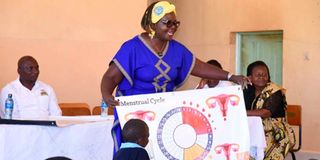Menstrual health acquires new definition

Khayanga Wasike, a member of Soroptimist International Club of Eldoret trains young ones on menstrual hygiene to mark the World Menstrual Hygiene Day in 2019.
What you need to know:
- There is a new definition of menstrual health developed by global health leaders, researchers and non-State partners.
- It defines menstrual health as a state of complete physical, mental, and social wellbeing and not merely the absence of disease or infirmity, in relation to the menstrual cycle.
There is a new definition of menstrual health developed by global health leaders, researchers and non-State partners.
Developed by Terminology Action Group of the Global Menstrual Health and Hygiene Collective, whose membership is drawn from UN agencies, civil society, academic institutions and private sector organisations draws attention to the urgency for collective action to end stigma associated with menstruation.
It defines menstrual health as a state of complete physical, mental, and social wellbeing and not merely the absence of disease or infirmity, in relation to the menstrual cycle.
Dr Ian Askew, who spoke during a virtual Menstrual Health Symposium 2021 hosted by United Nations Population Fund (UNFPA) East and Southern Africa on May 26, said the new definition underscores the fact that menstrual health is a public issue and requires collective participation to ensure girls and women menstruate with dignity.
"It also appreciates the fact that although women and girls are the majority who experience menstruation, transgender and non-binary people may also experience menstruation so should be included (in menstrual health)” said Dr Askew, the Sexual And Reproductive Health and Research Director at World Health Organisation (WHO).
Psychological distress
He noted that there is need for urgent actions to ensure girls and women have their periods without fear of stigma or psychological distress.
According to the Collective partners, who include WHO and UNFPA, menstrual health can be achieved if girls and women are provided with accurate, timely, age-appropriate information about the menstrual cycle, menstruation, and changes experienced throughout the life-course. This is in addition to information on self-care and hygiene practices.
They also call for deliberate actions to ensure the girls and women have access to effective and affordable menstrual materials as well as supportive facilities and services, including water, sanitation and hygiene services.
UNFPA Sexual and Reproductive Health Branch Chief Anneka Knutsson, said it is time for stigma associated with menstruation to end.
She said integrating menstrual health in sexual and reproductive health services will ensure women and girls have universal access to the crucial health services to live a fulfilling life.
The world will tomorrow mark Menstrual Hygiene Day under the theme 'We need to step up action and investment in menstrual health and hygiene now!'




